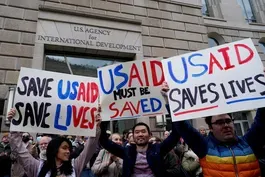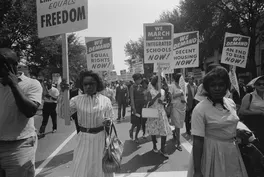
February 8, 2025 - PBS News Weekend full episode
2/8/2025 | 26m 44sVideo has Closed Captions
February 8, 2025 - PBS News Weekend full episode
February 8, 2025 - PBS News Weekend full episode
Major corporate funding for the PBS News Hour is provided by BDO, BNSF, Consumer Cellular, American Cruise Lines, and Raymond James. Funding for the PBS NewsHour Weekend is provided by...

February 8, 2025 - PBS News Weekend full episode
2/8/2025 | 26m 44sVideo has Closed Captions
February 8, 2025 - PBS News Weekend full episode
How to Watch PBS News Hour
PBS News Hour is available to stream on pbs.org and the free PBS App, available on iPhone, Apple TV, Android TV, Android smartphones, Amazon Fire TV, Amazon Fire Tablet, Roku, Samsung Smart TV, and Vizio.
Providing Support for PBS.org
Learn Moreabout PBS online sponsorshipALI ROGIN: Tonight on PBS News Weekend, a federal judge blocks Elon Musk's Department of Government Efficiency from accessing sensitive records while plans to dismantle USAID are temporarily halted.
Then we explore the deep roots of DEI in this country as it comes under increasing attack.
And a mission by NASA to collect a piece of an asteroid offers new clues about the origins of life on Earth.
MAN: This is telling us that not just the water, but some of the building blocks of life actually were seeded onto Earth and other planets.
(BREAK) ALI ROGIN: Good evening.
I'm Ali Rogan.
John Yang is away.
Two courts have set back the Trump administration's plans to shrink the federal workforce and reshape the U.S. government.
This morning, a federal judge temporarily blocked Elon Musk's Department of Government Efficiency from accessing sensitive Treasury Department records, including Social Security numbers and bank accounts of millions of Americans.
That came after another judge paused until next Friday the administration's plan to place more than 2,000 employees at the U.S. Agency for International Development on paid leave.
It's a setback in President Trump's efforts to dismantle the global humanitarian agency, which the president says is engaged in unspecified fraud and corruption.
One of the two federal employee organizations that sued to halt the administration's plans is the American Foreign Service Association, whose members primarily work abroad.
Randy Chester is its vice president for USAID.
Randy, thank you so much for being here.
We know that some employees have all employees at USAID got emails saying you should be able to access the system.
Again, have access to emails and everything you need to do your job.
But sources I've been speaking with say that they still cannot log into the system and they have no access.
Where do things stand, as you're aware?
And are the people running what remains of USAID right now?
Are they complying with this court order?
RANDY CHESTER, Vice President, AMERICAN FOREIGN SERVICE ASSOCIATION: Well, so far, like you say, Ali, what I'm hearing is the same that people are writing in to me saying they still don't have access to their systems and the public facing website now is completely dark.
So I'm not sure they easily flip the switch and cut people's services off.
You'd think they could flip the same switch and turn services back on for us.
ALI ROGIN: And you're going to have another hearing on February 12.
What is that one?
What are you hoping to get out of that one?
And what happens between now and then?
RANDY CHESTER: It's a good question.
I think on the 12th, our team of lawyers will be presenting additional evidence and arguments to make the temporary restraining order permanent.
In return, take away the threat of being placed on administrative leave and for our colleagues overseas, take away the threat of them having to return without proper planning, without knowing what or where they're going to be doing.
So I think the point of the hearing on Wednesday is to just do that, get the judge to say this must stop and it's going to stop now.
And let's move on.
Let's start really doing the business of the federal government and what we do day in and day out and that serve the public of America.
ALI ROGIN: So speaking of the business of the federal government, this temporary restraining order is in place now.
There is also though the Stop Work order that went into effect.
So, so even if USAID officials have access to the systems, again, they're not being placed on leave.
Are they going to be able to do their jobs?
RANDY CHESTER: It is a problem and it is a big problem because the Stop Work Order is not just affecting what we do as individual Foreign service officers.
It's limiting and stopping all work we do overseas.
Humanitarian assistance has stopped effectively.
Our work promoting women and girls development, economic development opportunities for women and girls, our work supporting immunization programs has stopped.
These programs are vital not just for the countries we work in, but they're vital for Americans as well.
ALI ROGIN: So tell me about how your officers who are abroad are dealing with this.
How are they?
What are they telling you right now about what it's like in the field?
RANDY CHESTER: In the field, there's no work going on.
But the way that this is impacting our officers is tremendously stressful.
It's harming them personally as individuals, and it's hurting their families.
I was on the phone earlier last week with a colleague, and in the background, her child was crying because she had just told her that they may have to leave where they've been living the last year and come home to America, to an uncertain future.
ALI ROGIN: We've seen the efforts to literally remove USAID presence here in Washington.
If these court orders do what you hope they do, ultimately, is there a way to reverse what has already been done?
Or in your view, is the mission that these Foreign Service officers serving irreparably altered?
RANDY CHESTER: It'll be a new environment for sure.
I mean, you've probably seen the reports and maybe you've seen the building.
They took our name off the Ronald Reagan building yesterday.
And that is a obvious sign of what the administration wants to do with USAID.
Hopefully, we can work with the State Department, who we work with all the time, in coming up with a plan forward for what the U.S. policy for international development is and how USAID is a part of that going forward.
Where we work doesn't necessarily matter to us.
It's the work that matters.
And that's what we want to see preserved, is a U.S. presence overseas doing vital development projects that promote ties, promote friendship, promote businesses, and promote economic linkages and market development for Americans to tackle, to tap into overseas.
ALI ROGIN: What do you want Americans to know about USAID as this agency has become such a topic of conversation lately?
RANDY CHESTER: Well, I think it's important for Americans to know that Foreign Service officers are Americans.
We're patriots, first and foremost.
Most of us were born in America.
We come from small towns in Texas, Georgia, Alabama, Minnesota, Iowa.
I mean, we are America.
And what we do is we represent you overseas.
And that's what I think people don't know, is that we're really doing this on behalf of you and making these friendships and making these linkages and making the world a safe place and making the world a prosperous place.
And that benefits everyone in America, no matter where you live.
ALI ROGIN: Randy Chester, USAID representative for the American Foreign Service association, thank you so much for being here.
RANDY CHESTER: Thank you.
ALI ROGIN: President Trump is also taking aim at another Washington institution, the John F. Kennedy Center for the Performing Arts.
In a post On Truth Social, Mr. Trump said he plans to name himself chairman and fire members of the center's traditionally bipartisan board of trustees.
The president took issue with drag events held in 2024 and said they would stop.
The Kennedy Center said it did not receive any official communications from the White House, but that some individual board members received termination notices.
President Trump signed an executive order Friday to prioritize the resettlement of white South Africans in the United states through the U.S. refugee program, which he had suspended on his first day in office.
Mr. Trump alleged that white South Africans are now the target of oppression by the country's government, claiming a new South African law allows the racially motivated seizures of their land.
Trump administration adviser and South African born Elon Musk has previously criticized the South African government's policies as anti-white.
To the Middle East now, where the fragile ceasefire between Israel and Hamas has held up through the latest round of hostage and prisoner exchanges.
Three Israeli hostages were handed over to the Red Cross today after Hamas militants paraded the men onto a stage and forced them to speak at a ceremony.
Their emaciated appearance shocked family members in Israel.
Despite their joy at being reunited, Israeli Prime Minister Benjamin Netanyahu said their shocking frailty will not go unaddressed.
Shortly after the hostages were returned, Israel released 183 Palestinian prisoners and detainees, some of whom were serving sentences for militant attacks on Israel or lesser offenses like rock throwing.
Seven prisoners convicted of the most serious crimes will be transferred to Egypt.
Authorities are racing to recover the wreckage of a small commuter plane after it crashed off the coast of western Alaska.
Officials lost communication with the plane Thursday about 30 miles from its destination of Nome.
All 10 people aboard were killed.
Crews are now working to recover the victims and the wreckage from unstable sea ice before a winter storm hits the area in a matter of hours.
Still to come on PBS News Weekend, a new book aims to rebrand what it means to be a stay at home mom and how a NASA mission may give us a better understanding of the origins of life on Earth.
(BREAK) ALI ROGIN: Since President Donald Trump returned to the White House, rolling back diversity, equity and inclusion initiatives has been at the top of his agenda.
He's issued executive orders that target DEI programs, dismantling decades of federal anti-discrimination policy.
For Black History Month, John Yang explores the origins of DEI in America in our latest installment of Hidden Histories.
JOHN YANG (voice-over): Long before DEI became a household term, there were other efforts to move toward equal rights for all Americans.
Some of the earliest were in the late 1800s, during the post-Civil War Reconstruction era, as Southern states enacted Jim Crow laws making segregation in public spaces legal.
Congress established the Freedmen's Bureau.
It provided formerly enslaved people basic necessities, helped them look for jobs and acquire land of their own.
In 1866, President Andrew Johnson vetoed legislation to enforce those amendments, arguing that it discriminated against white people.
And pressure from white Southerners led to the closure of the Freedmen's Bureau just seven years after it had been established.
Nearly a century later, black Americans were still battling racism and discrimination.
CROWD: Freedom, Freedom, freedom.
JOHN YANG (voice-over): Led by icons like the Reverend Martin Luther King Jr., they united during the civil rights movement, pushing back against the systems that excluded them.
At the height of the movement, John F. Kennedy became the first president to call for affirmative action, using the term in an executive order targeting racial bias in the hiring practices of government contractors.
In 1964, President Lyndon Johnson signed the landmark Civil Rights Act, which banned employment discrimination based on race, color, religion, sex and national origin.
By the 1990s, a backlash had emerged over affirmative action, voters in California, Washington State, Michigan and Arizona banned its use in public employment and higher education admissions.
Then, May 25, 2020, George Floyd was killed by Minneapolis police, igniting months of protest across the nation and around the world.
MAN: Stand Up and fight.
JOHN YANG (voice-over): Racial justice was back in the nation's collective conscience, this time with support from large corporations, many of them created DEI committees and pledged to invest billions of dollars to promote racial equity.
But companies began ending these initiatives after the Supreme Court in 2023 banned affirmative action in college admissions.
Last month, Target joined a growing list of companies pulling back on their DEI commitments.
At the same time, though, employers like Costco and Delta Airlines are doubling down on theirs.
Today, DEI has become a political lightning rod, but its roots run deep in American history, and the quest for equity and justice goes on.
ALI ROGIN: Earlier, I spoke to Shaun Harper from the University of Southern California's Race and Equity Center.
I asked him to explain how the current debate surrounding DEI fits into its broader history.
SHAUN HARPER, USC Race and Equity Center: I think that this is a very particular moment in which the three letters DEI are being scapegoated, villainized.
Everything is being blamed on those three letters.
But as it turns out, most polling shows that most Americans actually believe that diversity is a good thing for our country, that people ought to be treated equitably, and that workplaces and retail environments and schools and so on ought to be inclusive environments.
So the sort of broader ideals of DEI very much remain at the American core.
But it's just that those three letters, the three letter acronym, is being politically scapegoated during this time.
ALI ROGIN: Why has it become so politicized?
SHAUN HARPER: Let's rewind almost five years ago when Minneapolis police officer Derek Chauvin murdered George Floyd.
And we all saw it play out via Darnella Frazier's video footage.
You know, that forced a global reckoning with structural and systemic racism here in the United States.
That was a conversation, frankly, that most Americans didn't care to have, and they were certainly unprepared to have it, but yet they were dragged into it.
So what we saw almost immediately, you know, after that summer of racial reckoning, if you will, was a bit of an allergic reaction.
Well, that allergic reaction then became legislative as states across the country began to defund and ban the teaching and learning about diversity, equity and inclusion in schools and DEI offices.
So I don't blame the whole thing, obviously, on Derek Chauvin's murder of George Floyd, but it certainly marks a pivotal chapter in our nation's history.
ALI ROGIN: As you mentioned, there are DEI programs that came about at companies and government entities across the country.
What was the intended goal of those sorts of efforts?
SHAUN HARPER: The intended goal of those efforts was to right America's past and present wrongs as it pertains to racism, sexism, homophobia, transphobia, disability, discrimination, so on and so forth.
Those efforts certainly were not intended to divide people or to sort of force them into two categories, privileged and oppressed.
That's the narrative that's sort of wrapped around misinformation.
But most of those efforts were the antithesis of that.
They intended to bring people together.
They intended to help close gaps, and they intended to help us think about how to make our schools and companies and our communities, you know, more fair and more inclusive.
President Trump in his initial days announced that he was going to be ridding the federal government of anything pertaining to DEI and those individual words.
Certainly we don't yet know the scope of what that really means.
There's a lot in flux.
But I'm wondering, from your perspective, what is that going to mean for Americans?
SHAUN HARPER: It's bad for our democracy.
It will lead to greater polarization.
It will lead to more divisiveness.
It will lead to lots of people losing their jobs.
Federal professionals who do DEI work as well as professionals in corporations and in other places will lose their jobs because they're caught in the political crosshairs, not because they've done something bad.
What we will also see is an uptick in costly litigation that will cost the American taxpayers millions, perhaps billions of dollars as many Americans are experiencing harassment, discrimination and abuse.
You know, DEI policies and programs, again, help to protect against those things.
ALI ROGIN: Sean Harper, founder of the USC Race and Equity Center.
Thank you so much for joining us.
SHAUN HARPER: Thanks so much.
ALI ROGIN: For some women, leaving the workforce to care for children or family is a choice.
For others, it is a necessity.
But Neha Ruch doesn't think a career pause means putting aside your professional ambitions.
She founded Mother Untitled, a group dedicated to challenging conventional ideas about stay at home motherhood.
I recently spoke with Neha about what inspired her new book, "The Power Pause: How to Plan a Career Break After Kids and Come Back Stronger Than Ever."
NEHA RUCH, Author, "The Power Pause": It was the height of the lean in movement, the height of the girl boss era.
2016, when I had my first son, and when I was rocking with him in that rocking chair, I suddenly felt like I wanted more time with him.
And when I decided to pause and shift my career, I had every intention on returning.
And yet I started hearing from everyone in my corner, are you giving up?
Did you waste a spot at business school?
And I was meeting all these incredible women, similar to myself, had clocked in a decade in their career, had really modern relationships with their husband, who were making strategic choices to pause or shift.
And all of them were at the receiving end of unwelcome commentary like that.
And I realized that were all facing this very outdated perception of the stay at home mother.
We never updated for the modern reality of women having children, or so they've accrued education and work experience.
They have access to digital tools and technologies.
So very few of them are shut in and stagnant like the word implies.
And really they're keeping themselves connected and creative in so many interesting ways.
And so I started the platform back then and it's grown since.
ALI ROGIN: And choosing to put your career on pause in many cases means putting on pause other elements of your life.
You know, a space and time outside the home, things that are often intrinsic to a woman's identity.
How can women prepare for that personal shift?
NEHA RUCH: I think acknowledging that it is an identity shift.
Right.
Answering the question, what do you do in this country?
Has come to stand in for who are you?
Right.
And so having to say I'm a stay at home mom somehow feels like it doesn't convey all the ways you're still active and interesting.
And so women fear that.
And I want to say first, you can just say, right now, I get to be with my kids, or I am with my kids, we'll see what comes next.
And what that does is gives you language to walk through this stage of life with confidence.
But it also reaffirms that all of those skills and accomplishments that you gained in your professional life before do not evaporate.
ALI ROGIN: And certainly you talk a lot about in the book of how sometimes it's not a choice, sometimes it's out of necessity, out of financial necessity.
But regardless of what brings you to that career pause moment, you also write about how it can be a positive in terms of your career.
It can actually help you once you are ready to upshift again.
NEHA RUCH: Right.
So career pauses are not life pauses, right?
Like we are still moving forward in many ways.
And actually, you know, when you look at how long our careers last, career pauses can actually help make them more sustainable.
And so in pausing or shifting our careers to make room for family life, we can actually make room to tune into what actually lights us up, new skills learned in caregiving.
If you've ever spent a minute with a child, right?
It's the ultimate leadership training ground.
And then we're also giving ourselves a chance to deepen our networks in nontraditional ways, explore new interests through volunteering or through online certification class or new hobbies.
Even if we don't have the same amount of time available to us, we can still get strategic about ways in which to grow that then end up serving us on our return.
ALI ROGIN: And what is your advice to women who are at the end of this career pause and are ready to return to something else, whatever they were doing.
NEHA RUCH: Before that, Well, I hope they, as soon as they feel that nudge, you know, I'm ready for something else.
The star studying themselves, taking stock of all the ways in which they are contributing, participating, volunteering, things that light them up, things that make them feel proud.
It can be advising a friend on their business, it can be volunteering for the school that accomplishes two things, right?
So I use the example of this woman down in North Carolina who took stock of all the different ways that she was staying engaged.
And one of the things that popped out was how she coordinated a bus route for her local organization.
And in looking back, what it did was reveal two things that she was really interested in project management.
And now she was going to round out her experience with an online certification class.
And then the part two was that when she went to add to her resume, career sabbatical for family life.
She was able to look at the bullets that stood out and apply fancy language like implemented highly technical infrastructure, change to local organization.
And it gave her a powerful talking point to be able to convey with confidence how she was committed to this return, but also how she had developed that experience during her time away.
ALI ROGIN: Fascinating.
Such important advice for anybody in any stage of their career, parenthood or both.
Neha Rush, creator of Mother Untitled and the author of "The Power Pause."
Thank you so much for being here.
NEHA RUCH: Oh, I'm so grateful.
ALI ROGIN: Science has made great progress in telling the story of how Earth was formed more than four and a half billion years ago.
Volcanic eruptions, earthquakes, and plate tectonics shape the landscape.
But the origins of life on our planet remains one of the great mysteries of science.
Now, a mission by NASA to collect a piece of ancient asteroid and bring it back to Earth has revealed that the building blocks of life may have been scattered throughout the solar system billions of years ago.
MAN: 50 miles an hour, you can see it glowing brightly in the sky.
ALI ROGIN (voice-over): Tensions were high at NASA on September 24, 2023, as this capsule, cradling the agency's first ever asteroid sample, hurtled toward Earth, the culmination of a seven year journey.
MAN: Wow.
And after an exhilarating streak across Earth's atmosphere, we have parachute deployment.
You can see just a sigh of relief from the team.
I can hear some applause here.
ALI ROGIN (voice-over): While rocks known as meteorites land on Earth quite often, this sample was collected after touching down on the surface of an asteroid streaking through space.
It was carefully sealed by NASA's spacecraft to protect it from the Earth's atmosphere and then sent home.
Michelle Thompson is an associate professor of Earth Atmospheric and Planetary Sciences at Purdue University.
MICHELLE THOMPSON, Purdue University: Asteroids are really like relics from the early solar system.
If you think about Earth, the surface is changing all the time.
We have volcanoes, we have earthquakes.
But asteroids have not been significantly altered since they were formed four and a half billion years ago.
MAN: You ready to see the results of the mission?
ALI ROGIN (voice-over): Preliminary analyses of the asteroid showed it contained water, carbon, nitrogen, and other organic matter.
But the space rock held even more secrets.
Last week, scientists revealed the sample also included amino acids, considered the building blocks of life and other components found in DNA.
This discovery has given momentum to a theory in the scientific community that not only can an asteroid destroy life as it did with the dinosaurs, but it can also spread it.
Tim McCoy of the Smithsonian Institution is one of the lead authors who studied the sample.
TIM MCCOY, Smithsonian Institution: We've thought for a while that the water on Earth certainly could have come from an asteroid because we've seen water for a long time.
This is telling us that not just the water, but some of the building blocks of life actually were seeded onto Earth and other planets.
It wouldn't have been limited to just Earth.
ALI ROGIN (voice-over): The Osiris Rex spacecraft, now called Osiris Apex, which collected this extraordinary sample, is now aiming at a new target.
It's on a path to rendezvous with the Apophis asteroid when it whizzes by the Earth in 2029.
ALI ROGIN: And that's our program for tonight.
I'm Ali Rogin.
For all of my colleagues, thanks for joining us.
See you tomorrow.
Fate of USAID in question as judge sets back Trump’s plans
Video has Closed Captions
Fate of USAID in question as judge sets back Trump’s efforts to dismantle agency (5m 39s)
The history of diversity, equity and inclusion in America
Video has Closed Captions
The history of diversity, equity and inclusion efforts in America (7m 15s)
How a NASA mission may help us understand life’s origins
Video has Closed Captions
How NASA’s OSIRIS-REx mission may help us understand the origins of life on Earth (2m 45s)
News Wrap: Trump takes aim at Kennedy Center trustees
Video has Closed Captions
News Wrap: Trump takes aim at Kennedy Center’s board of trustees (2m 39s)
‘The Power Pause’ aims to rebrand stay-at-home motherhood
Video has Closed Captions
‘The Power Pause’ aims to rebrand what it means to be a stay-at-home mom (5m 27s)
Providing Support for PBS.org
Learn Moreabout PBS online sponsorshipMajor corporate funding for the PBS News Hour is provided by BDO, BNSF, Consumer Cellular, American Cruise Lines, and Raymond James. Funding for the PBS NewsHour Weekend is provided by...

















